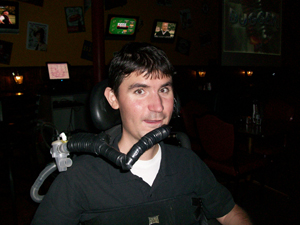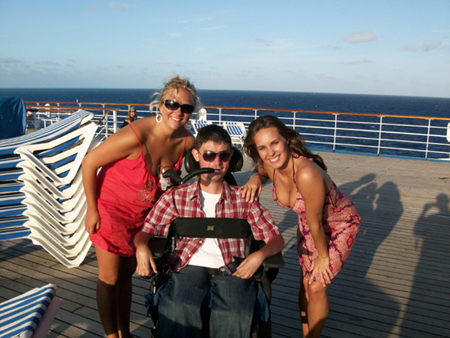There are some stories that just need to be told. These stories have a universal ability to inspire us all. The story of Harold Lee Murphey and his mother Nita Guinn is one of those stories.
Lee was born Christmas Day, 1977, premature, with an underdeveloped lung. Over the next couple of years, that condition slowed Lee’s development, at least that is what doctors and the family believed. He was close to normal, just not as quick to progress as other children. Because of his condition at birth, everyone accepted that someday he would catch up. Everyone believed this. Everyone except Nita. She believed early on that there was something wrong with Lee other than slow development. Call it a mother’s intuition or as she described it “a gut feeling,” but Nita could not let it go. She knew there was something more at work here.
Doctor after doctor told her he was okay and he would catch up to the other children. But Nita was so convinced that there was a more serious problem, she took Lee to a pediatric specialist she knew and trusted in Virginia. He delivered the same diagnosis–that Lee was just slow to develop. Nita persisted that there was something other than that wrong and the doctor referred her to a colleague who specialized in childhood diseases. After running some tests, this doctor confirmed Nita’s fears and diagnosed Lee with Duchene’s Muscular Dystrophy, a degenerative disease predominately found in male children; it does not usually show up till around five years of age. A child with Duchene’s is only expected to live into their late teens. Nita’s reaction to this news was the same as anyone who has ever been told their child is dying: anger, despair, fear and eventually acceptance. Her words say it all, “He’s a special child with special needs and God has entrusted me to take care of him.”
Taking care of Lee is exactly what she did. But, it took a great deal more than just tending to Lee’s medical needs. There were many fights that had to be fought, many hills to climb, just to get him the same treatment any other child would have. While living in Orlando, Fla., she had to take on the school board to stop them from placing Lee in “special classes.” The school wanted to treat him like he had a learning disability. Even today, many look at people in wheelchairs as learning impaired. If always treated that way, that is what they will expect. Nita didn’t let that happen to Lee.
“I always tried to let him do the things that he’s capable of and I wanted him to have a mainstream education,” Nita said. There is a presumed prejudice that follows handicapped people, a prejudice that allows normally fair-minded people to assume that a person is slow or unable to function in society due to their handicap.
“I wish Lee would write a book about his life. So many could benefit from it. He should call it ‘I Can Hear.’ So many people come up to Lee and shout at him like he’s hard of hearing. Just because you’re in a wheelchair don’t mean you can’t think, hear or feel. The arms and legs might not work but the heart still does.”
Duchene’s Muscular Dystrophy is a harsh disease that gradually degenerates the body—muscle apathy followed by assisted walking, a wheelchair, gradual paralysis and typically death before age 20.
“Mostly it’s a slow process,” Nita explains, “but sometimes the disease would progress quicker, especially after one of his many surgeries. Lee was able to play like any other child for a while and this activity certainly slowed the progress of the disease. But by age 7, Lee had leg braces and then a walker. Around age 10 he had to use a wheelchair. First he could push himself in the chair, but by age 11 he had to use a motorized chair. Lee was excited to have the new chair, because it allowed him to do things and go places he couldn’t before. Deterioration of his condition, to the point that he needs a motorized chair, gave him more freedom, the irony of this is palpable.”
Oftentimes, children effected by the disease are not sent to school or given the opportunity to see what their bodies are capable of, but are confined to a wheel chair and just await death. Doctors, society and even the parents themselves give up on these children. A lack of knowledge, the onset of depression and unyielding pressure from society compels many parents to hide the child away and wait for the inevitable. But according to Nita and Lee, it doesn’t have to be that way.
Nita’s story is one of dedication, a stubborn belief that her son should have every chance that any child should, a singular determination to give Lee every chance that she possibly could. Singular because she mostly did it by herself.
The only struggle that is as admirable as Nita’s is the story of Lee himself. As a child we all look to our loved ones for example. When we grow into the adults we are, it’s because of their examples and our own experiences. Lee is very lucky in one sense–he had a great example. When talking about his mom, Lee smiles and says, “She does not take ‘no’ for an answer. She made sure I always had the best doctors and when one told her something she didn’t like, she would find a better one.”
Nita was also successful in getting Lee that mainstream education. He graduated high school in 1997 and for most of his high school years, he was on the honor roll. During high school, Lee developed an interest in computer-aided design. One of his teachers told him he would never be able to do the work well. That teacher was wrong. Lee graduated from Tennessee Technology Center in 1999 with a degree in AutoCAD. Not satisfied with that, he went back to college. In 2006, he received his bachelor’s degree in journalism from MTSU. When he crossed the stage at graduation, he received a standing ovation.
Lee also maintains an active social life. He enjoys going out with his friends, singing karaoke and playing poker. His favorite drink is Captain Morgan and Coke. When Lee goes out to any of the places he likes, he generally goes with a group of friends. His condition has not blocked him from enjoying life any more than it has blocked him from his education. When talking about dealing with his conditions, Lee simply says, “I just don’t let it stop me.”
For those suffering from Muscular Dystrophy and their families, Lee has some advice: Don’t give up, the doctors are not always right. They don’t know everything. They are not gods.
Lee is proof of that. He was not supposed to live to see 20, and he will be 33 on his next birthday. Lee is hopeful for a cure for MD. There is promising research being done with protein drugs. This research is in its latter stages, and a usable drug is expected within ten years. He spoke of this with the enthusiasm of a person who has just been given a reprieve. But the reprieve is not for Lee. The drug is only to helpful to those in the early stages of the disease. That doesn’t seem to matter, as he is still excited about it. He spoke of children he knows of who had Duchene’s MD and whose parents had given up or refused to try. In his words, you can hear the hope that MD would soon be a thing of the past. Lee is paralyzed now but he still has some control of his hands. He can still type and control his wheelchair. When asked how long she expects Lee to live, Nita said “I’m not even going to speculate. We are focused on living, not on dying.”
Lee tells everyone that he is going to outlive everyone just to aggravate them.
“You won’t hear Lee having a pity party, I have one every now and again, but only for about 15 minutes. Nobody else comes to the party or brings refreshments, so there’s no point carrying it on,” Nita said.
In the closing minutes of the conversation with Nita, she spoke reflectively on Lee’s life and her own trials as a mother. “The hardest part is watching him lose the ability to do the things he loves to do. One of the most remarkable things about Lee is that he did these things and at any point he could have said, ‘I can’t do this.’ There were times when he was in high school, that he was home bound due to a surgery or illness and his teachers would come by. Although he was too sick to sit up, they would sit on his bed and give him his studies. He could have said at any point, ‘I can’t go on’ and we would all had to have said ‘okay.’ But he didn’t. He was determined to finish his education. His goal was to get a job, but that’s near impossible now. A lot of people can’t see beyond the wheelchair.”
Lee’s story is one that needs to be told. There are a lot of children out there who have Duchene’s MD and will never go to school because their families don’t put the effort into these children. This is not because they don’t care, but because they have been told their children won’t live long. Many don’t know their rights, and they accept what they are told or what’s forced on them by society’s view of the handicapped. Nita summed this up nicely, “Just because someone is challenged or different doesn’t mean they can’t get the same education as the rest of the world.”
Lee was born on Christmas day and has outlived any prognosis for his condition. A person of faith could make the argument that his life is a miracle and that might be right. If it is, it’s a miracle born out of the unwavering love and devotion of a mother and an iron will to survive despite the odds. Not only survive, but accomplish things many of us only dream about. You can call it just an opinion, but it seems to me that Harold Lee Murphey learned to soar while sitting in a wheelchair.















Great story for a great man. Thanks Tony for writing it and thanks Lee for sharing. I too think it would be a great idea for Lee to write a book of his life. I would certainly be first in line to buy one. Miss you Lee.
Comment September 3, 2010 @ 5:49 pm
Our son also had Duchenne. When he was first diagnosed I had the blessing of meeting Nita and later Lee. Nita was such an encouragement and so wise. I always knew I could contact her if I needed her advice. Our son, Josh lived to be 23 years 8 months and 2 days old. With the progress that is being made more and more make it into their twenties and some even the thirties.
Comment March 9, 2018 @ 10:57 am